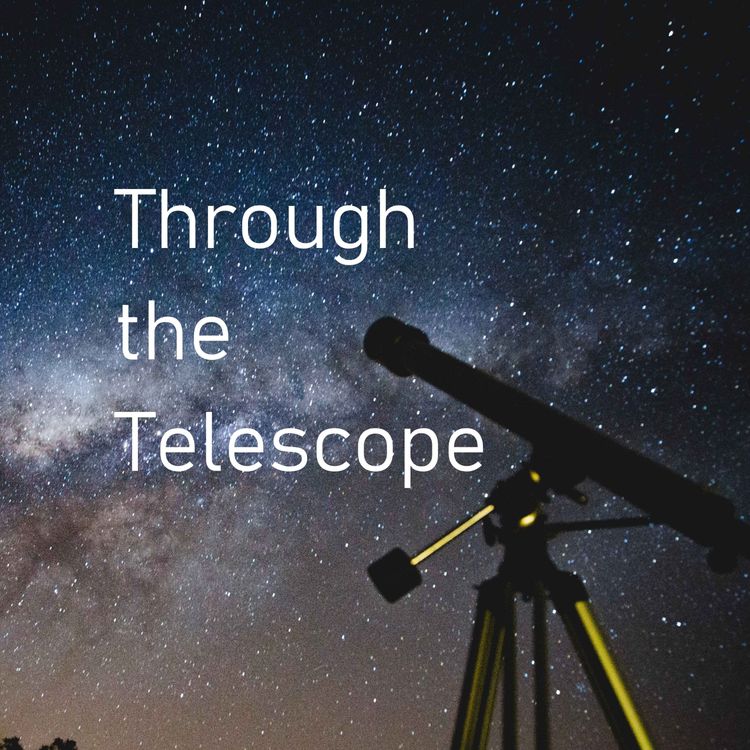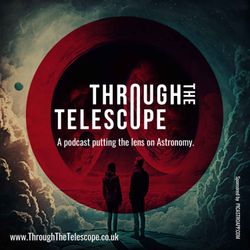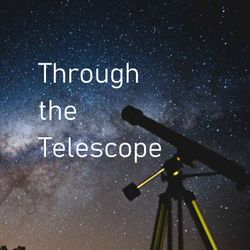Share

Through the Telescope
Solar Activity and Solar Sails
Ep. 8
•
Rose and Elliott look at the activity of the Sun, what the surface looks like and the importance of magnetic fields. From coronal mass ejections, to flares and sunspots, they discover all the weather you can expect on the Sun before looking at how it can be used to drive spacecraft with solar sails.
Find us at throughthetelescope.co.uk
Links relating to this episode:
Near-live images of the Sun and its features: https://sdo.gsfc.nasa.gov/data/dashboard/
Solar cycles: https://www.esa.int/Space_Safety/Solar_cycle_25_the_Sun_wakes_up
LightSail: https://www.planetary.org/sci-tech/lightsail
Music:
"Nowhere Land" Kevin MacLeod (incompetech.com)
Licensed under Creative Commons: By Attribution 4.0 License
http://creativecommons.org/licenses/by/4.0/
More episodes
View all episodes

21. Centaurs and Where to Find Them
57:07||Ep. 21In this episode Rose and Elliott are on the hunt for centaurs. What are they, where are they and how in the universe did they get that name? All will be revealed, as the pair find out the answers, as well as how far out does something have to be named FarFarOut?Find us at throughthetelescope.co.ukMusic:"Nowhere Land" Kevin MacLeod (incompetech.com)Licensed under Creative Commons: By Attribution 4.0 Licensehttp://creativecommons.org/licenses/by/4.0/
20. Mars, Rovers and Theses
01:26:34||Ep. 20This episode starts with some exciting news for Rose before looking at the Red planet. One of our nearest neighbours, and a target for space exploration, Rose and Elliott look at how unlike the Earth Mars really is. Is Mars really as you expect it to be? As well as some of the features of the Martian environment, the duo look back at the history of Mars exploration and the potential future for human colonisation.Note: this episode was due to be released last week but unfortunately family circumstances made that impossible.Find us at throughthetelescope.co.ukMusic:"Nowhere Land" Kevin MacLeod (incompetech.com)Licensed under Creative Commons: By Attribution 4.0 Licensehttp://creativecommons.org/licenses/by/4.0/
19. The End of the Universe and how we get there
01:03:18||Ep. 19This time Rose and Elliott speed into the future as they look at some of the cosmic events that are headed our way in the ever more distant future. From hypernovae to supervolcanos, the future of the Sun and the Milky Way and ending at the ultimate end, the death of the Universe, they look at what lies ahead, what ending is most likely for our reality, and if we can even really have a chance of knowing.Find us at throughthetelescope.co.ukMusic:"Nowhere Land" Kevin MacLeod (incompetech.com)Licensed under Creative Commons: By Attribution 4.0 Licensehttp://creativecommons.org/licenses/by/4.0/
18. The Moon, getting there and going back
01:15:42||Ep. 18This time Rose and Elliott look at our closest neighbour, the Moon, the only other object humans have set foot on. They look at where it came from, why it’s so big, and how it can be surprisingly hot. They also take a look at the dark side, Apollo astronauts and the future of Moon exploration, the Artemis project, and its competitors. Find us at throughthetelescope.co.ukMusic:"Nowhere Land" Kevin MacLeod (incompetech.com)Licensed under Creative Commons: By Attribution 4.0 Licensehttp://creativecommons.org/licenses/by/4.0/
17. Red dwarfs, M dwarfs and the difference between them
01:01:51||Ep. 17Rose and Elliott discuss small stars this week, looking at M dwarfs and how they relate to red dwarfs and brown dwarfs. What do these stars have in common, why do they behave so differently and why do they push what makes a star to the limit?Find us at throughthetelescope.co.ukMusic:"Nowhere Land" Kevin MacLeod (incompetech.com)Licensed under Creative Commons: By Attribution 4.0 Licensehttp://creativecommons.org/licenses/by/4.0/
16. Earth, Life and Aurorae
01:05:32||Ep. 16In this episode, Rose and Elliott look back at our own planet, and it’s most unique feature, life. What does Earth have that other planets don’t, is the habitable zone a meaningful name, and what makes a breathable atmosphere? They also look at the Earth’s magnetic field and the aurorae and the variety of environments the planet hosts..Find us at throughthetelescope.co.ukMusic:"Nowhere Land" Kevin MacLeod (incompetech.com)Licensed under Creative Commons: By Attribution 4.0 Licensehttp://creativecommons.org/licenses/by/4.0/
15. Stellar Clusters and SpaceX
41:49||Ep. 15Rose and Elliott look at a few different things this week, as their schedules have been a bit disrupted. They answer a question on stellar clusters, talk about the reputation of scientists and about THAT SpaceX launch and how important it is to learn from your mistakes. They also talk about their recent space-related and not-so-related reading. Find us at throughthetelescope.co.ukMusic:"Nowhere Land" Kevin MacLeod (incompetech.com)Licensed under Creative Commons: By Attribution 4.0 Licensehttp://creativecommons.org/licenses/by/4.0/
14. What has Space Ever Done for Us? Part 2
59:32||Ep. 14Rose and Elliott continue trying to answer why space matters, this time looking at some of the things we have on Earth as a result of space exploration. In this episode they look at the materials and technologies that impact our lives from health to food and energy and why space provided the spur to discover them or at least bring it closer. They also talk about handheld vacuum cleaners. Find us at throughthetelescope.co.ukMusic:"Nowhere Land" Kevin MacLeod (incompetech.com)Licensed under Creative Commons: By Attribution 4.0 Licensehttp://creativecommons.org/licenses/by/4.0/
13. What has Space Ever Done for Us? Part 1
01:08:03||Ep. 13Rose and Elliott try to answer why we should care about space by looking at some of the things space exploration has done for us, from societal views and experiences to the more tangible benefits. In this episode they focus on the role of satellites in society, from navigation to meteorological and environmental monitoring. They also look at citizen science, penguin poo and archaeology, as viewed from space. Find us at throughthetelescope.co.ukLinks relating to this episode:Citizen science at Zooniverse: https://www.zooniverse.org/Satellites in Egyptology: https://www.smithsonianmag.com/innovation/space-archaeologist-sarah-parcak-winner-smithsonians-history-ingenuity-award-180961120/Search for Iram of the Pillars: https://earthobservatory.nasa.gov/features/SpaceArchaeologyMusic:"Nowhere Land" Kevin MacLeod (incompetech.com)Licensed under Creative Commons: By Attribution 4.0 Licensehttp://creativecommons.org/licenses/by/4.0/